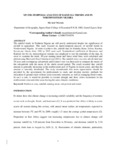| dc.description.abstract | The rainfall trends in Northern Nigeria are still poorly understood despite the significance of rainfall to agriculture. This study focused on spatio-temporal analysis of rainfall trends in Northwestern Nigeria. In order to achieve this, rainfall data for Kaduna, Kano, Yelwa, Katsina, Sokoto,and Gusau from 1956 to 2015 were used. Standardized coefficient of Skewness and Kurtosis for the six meteorological stations was employed to test the normality of the data. In order to examine the trend, 10-year running mean and linear trend lines were calculated and plotted using Microsoft Excel Statistical tool (2013). The rainfall series was also sub-divided into 10 years non-overlapping sub-periods and Cramer’s test was then used to compare the means of the sub-periods with the mean of the whole record period. The result revealed that rainfall amount is generally increasing in the northwestern part of Nigeria in recent years; and that the amount is unevenly distributed. The study recommends that more opportunities should be provided by the government for professionals to study and develop realistic methods for utilization of ground water without socio-economic concerns, as well as managing flood events. In such a case, it would be possible to counter drought and flood crises occurrence in the northwestern zone and other areas having the same climatic conditions. | en_US |

